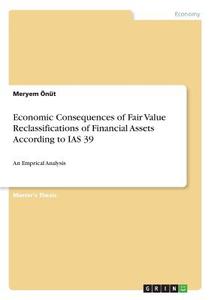
Economic Consequences of Fair Value Reclassifications of Financial Assets According to IAS 39
An Emprical Analysis
- Editore:
GRIN Verlag
- EAN:
9783668549913
- ISBN:
3668549915
- Pagine:
- 112
- Formato:
- Paperback
- Lingua:
- Tedesco
Descrizione Economic Consequences of Fair Value Reclassifications of Financial Assets According to IAS 39
Master's Thesis from the year 2015 in the subject Business economics - Accounting and Taxes, grade: 2,0, University of Hohenheim, language: English, abstract: The purpose of this thesis is to provide direct empirical evidence on the use of the Amendment according to IAS 39 regarding the reclassification of financial instruments. It therefore reviews what happened when the accounting policies were switched from fair value accounting to historical accounting during the financial crisis in 2008. Using a sample of manually collected data from Western European banks, the thesis empiri-cally examines which banks used this reclassification option to deal with problematic financial assets and how these reclassification activities are correlated with other firm characteristics. Furthermore, the thesis shows the influence of the amount of assets in each fair value level on the fair value hierarchy and the impact of the banks¿ regulatory capital during the height of the financial crises on the use of the relaxation option. The final aim is to analyze the economic consequences of this option and to determine how beneficial it is for the global financial system, considering that banks will again make use of this sort of permission in other, future crises. After the development of the International Financial Reporting Standards (IFRS) by the International Accounting Standard Board (IASB) in 2001, the European Union (EU) decided to unify the jurisdictions for all listed corporations and therefore decreed a mandatory adoption of IFRS in the EU. The EU reasoned that common ac-counting standards improve capital market efficiency and reduce information processing and auditing costs. However, the decisive reason for the adoption of IFRS was that today¿s global economy requires global standards to ensure transparency, accountability and comparability of financial accounts. IFRS was preferred because of its focus on a fair value-based method of accounting compared to historical cost accounting, and the EU claimed that adopting IFRS would bring financial stability while serving the interests of the public.



